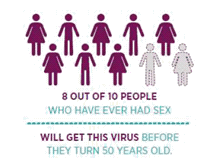HPV Vaccine is Cancer Prevention
HPV, or human papillomavirus, is a common virus that can lead to 6 types of cancers later in life for both men and women. It is spread from person to person through oral, anal, or vaginal sex, or other skin-to-skin touching during sexual activity. Although most HPV infections go away by themselves within 2 years, some last longer and can cause genital warts and certain types of cancer such as:
- cervical, vaginal, vulvar, and penile; and
- certain cancers of the anus and throat including the tongue and tonsils
HPV infections are so common that nearly all men and women will get at least one type of HPV infection at some time in their lives. More than 42 million Americans are currently infected with HPV types that cause disease. About 14 million Americans, including teens, get the virus each year.
Preventing Cancer
Males and females ages 9 through 45 may receive the HPV vaccine, which can protect them against the HPV-related cancers mentioned above.
Young Boys and Girls
Boys and girls can begin receiving the HPV vaccine at ages 11-12, but it can be given as early as 9 years old. Vaccines, such as DTaP, MMR, and Varicella (chickenpox), help protect your child before they are exposed to a disease, which is why the HPV vaccine is recommended before they are exposed to the virus. At this age, only 2 doses are needed. Boys and girls who start the vaccine after their 15th birthday receive 3 shots over 6 months.
Teens and Adults
Men and women through age 26 should get the HPV vaccine if not already vaccinated. Adults aged 27 through 45 who haven’t gotten the HPV vaccine should talk to their doctor about their risk for new HPV infections.

Why get the HPV vaccine?
- The vaccine offers protection against cancer-causing infections and precancers (changes in cells that happen before cancer).
- HPV types that cause most HPV cancers and genital warts have dropped 88 percent among teen girls and 81 percent among young women.
- HPV is estimated to cause nearly 36,500 cases of cancer in men and women every year in the United States. HPV vaccination can prevent 33,700 of these cancers by preventing the infections that cause them. That's the same as the average attendance for a baseball game.
- Over 15 years of HPV vaccine studies have proved it to be very safe and effective.
Learn more reasons to be vaccinated!
Where to get the HPV vaccine?
Contact your local county health department’s Family Planning Program or call 1-800-654-1385 to schedule your HPV vaccination today!
For more information about early detection and protection against HPV-related cancers, visit the CDC's Gynecologic Cancers and/or our Breast and Cervical Cancer Early Detection.
Additional Resources
HPV: Cervical Cancer Prevention
Cancer Prevention Vaccines
HPV Roundtable - Resource Library
ADPH Oral Health
Page last updated: February 19, 2026




